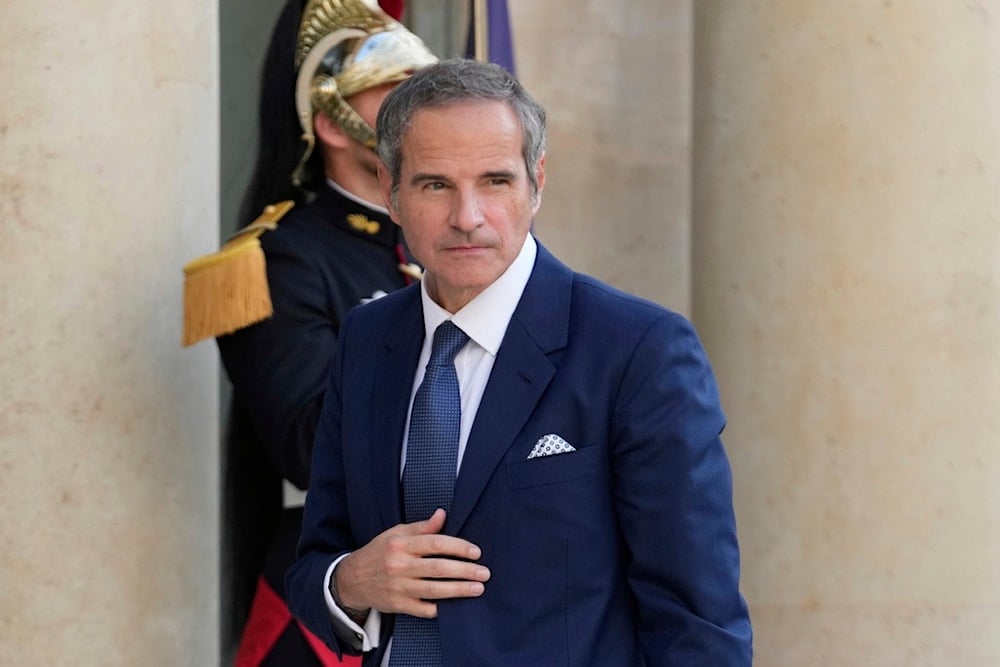IAEA withdraws from Iran after monitoring suspension
The IAEA has pulled its last inspectors from Iran amid rising tensions after US and Israeli airstrikes on nuclear facilities, suspending key monitoring of enriched uranium.
-

International Atomic Energy Agency (IAEA) Director General Rafael Mariano Grossi arrives for a meeting with French President Emmanuel Macron, Wednesday, June 25, 2025, at the Elysee Palace in Paris (AP)
The International Atomic Energy Agency (IAEA) announced on Friday that it has withdrawn its final team of inspectors from Iran, marking a dramatic escalation in the diplomatic standoff following US and Israeli strikes on the country’s nuclear facilities during a recent 12-day war.
In a post on X, the UN nuclear watchdog confirmed the inspectors had “safely departed” from Tehran and returned to its headquarters in Vienna. The move underscores the growing impasse between Iran and the IAEA amid heightened regional tensions.
Iran suspends cooperation with IAEA over safety concerns
Iran’s parliament has passed legislation suspending cooperation with the agency until the safety of its nuclear infrastructure can be ensured. While Iran has yet to officially notify the IAEA of the suspension, the agency’s ability to monitor Iran’s nuclear program remains effectively frozen.
“The inspection regime cannot afford further disruption,” IAEA Director General Rafael Grossi warned in a press conference last week, emphasizing the urgency of restoring access.
Iranian Foreign Minister Abbas Araghchi, however, maintained that Iran remains committed to the Nuclear Non-Proliferation Treaty (NPT), under which the country must account for all enriched uranium and allow international verification.
Fallout from Israeli, US strikes
The latest standoff follows unprecedented military strikes by the Israeli regime and the United States that they claim destroyed or heavily damaged Iran’s three primary uranium enrichment sites, allegations that Iran denies.
Western diplomats say that while much of Iran’s nuclear infrastructure was targeted, the fate of Iran’s uranium stockpile, estimated at nine tonnes, including over 400 kg enriched up to 60% purity, remains unclear. According to IAEA standards, that material, if enriched further, could yield enough fissile matter for at least nine nuclear weapons.
Iran insists its nuclear program remains peaceful. However, Western powers argue there is no civilian justification for enrichment to such high levels, and the IAEA notes that no country has enriched uranium to such purity without eventually pursuing a nuclear bomb.
Accusations against the IAEA
Iranian officials and state media have sharply criticized the IAEA, accusing it of paving the way for the bombings through a report released on May 31. That report concluded that Iran was in breach of its NPT obligations, prompting a resolution from the IAEA’s 35-member Board of Governors.
Grossi has rejected accusations that the IAEA’s findings provided diplomatic cover for military action. “I stand by our report,” he stated, reiterating the agency's neutrality and the necessity of resuming monitoring efforts as soon as conditions permit.
The IAEA has expressed readiness to resume dialogue with Iranian authorities to reestablish its verification activities, which are central to global non-proliferation efforts.
Decree suspends IAEA cooperation
Iranian President Masoud Pezeshkian has issued a decree suspending the country’s cooperation with the International Atomic Energy Agency (IAEA), according to a report by Tasnim news agency on Wednesday.
The decision comes amid heightened tensions surrounding Iran’s nuclear program and follows recent legislative developments from the Iranian parliament.
Last week, Iranian Parliament Speaker Mohammad Bagher Ghalibaf announced that lawmakers had enacted a law mandating the suspension of cooperation with the IAEA, which he described as “Israel’s protector and servant.”
Ghalibaf argued that continued cooperation with the IAEA was untenable as long as the security of Iran’s nuclear facilities remained unresolved, claiming the agency’s impartiality had been compromised by its ties to "Israel".
Grossi barred from Iran's nuclear facilities
Meanwhile, Deputy Speaker of the Iranian Parliament, Hamid Reza Haji Babaei, announced on Sunday that IAEA Director-General Rafael Grossi has been barred from accessing Iranian nuclear facilities or placing surveillance cameras there, after Iran suspended all cooperation with the nuclear watchdog.
"We will no longer give Grossi permission to be present at [Iran's] nuclear facilities and install cameras [there] because we saw information about our facilities in documents received from ... the Israeli regime," Haji Babaei told ISNA news agency.
The Islamic Republic further exposed profound cooperation between the IAEA and the Israeli occupation, which prompted Iran to obtain, through a major intelligence operation, a vast trove of highly classified strategic documents and information tied to "Israel", well-informed sources told Al Mayadeen last month.

 4 Min Read
4 Min Read










